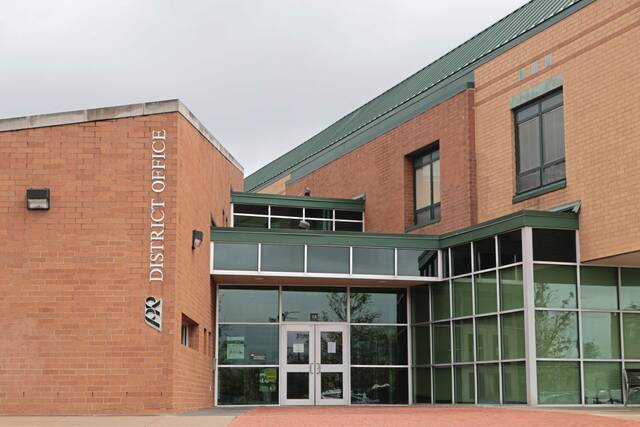https://triblive.com/local/pine-richland-school-district-plans-to-keep-property-taxes-unchanged/
Pine-Richland School District plans to keep property taxes unchanged

Pine-Richland School District officials have as unveiled a budget for the 2023-24 school year that calls for spending nearly $5 million more than this year without the need to increase property taxes.
If the school board votes to adopt the budget at its June 12 meeting, it will be the fourth consecutive year officials have held the line on real estate taxes.
The $106.3 million spending plan presented at the May 8 finance and governance meeting includes a $102.69 million general fund plus more than $3.64 million earmarked for capital projects that will be covered with a transfer to a reserve fund established for such expenses.
By leaving the 19.5867 mill rate used to calculate real estate tax bills unchanged, the owner of a property assessed at the district’s median value of $273,700 will pay $5,360.88 next year to fund school operations.
Pine-Richland’s millage rate has been unchanged since the 2017-18 school year, when it was increased by 2% over the previous year.
“The Pine-Richland board and administration has a strong track record for financial planning,” said Superintendent Brian Miller in a statement to the Tribune-Review. “The 2023-24 proposed budget maintains a flat millage rate. In addition, the district will be able to invest just less than $5 million in capital projects through the general operating budget.
“This reinvestment in district infrastructure helps strengthen our facilities,” Miller said. “During this same time period, we have expanded educational programs for students and reduced the debt profile. Given the strength of our academic and extracurricular programs, these financial decisions have provided a strong return-on-investment for our families and community.”
Major capital projects planned for next year include renovation to the main and auxiliary gymnasiums at the high school, upgrades to the heating, ventilation and air conditioning systems at Pine-Richland Middle School and replacement of the track surface at the stadium.
The bulk of the money to fund the new budget will come from the property tax levied on residents, which is expected to generate more than $66.2 million, or about $1.2 million more than this year. Revenue from the property tax is 64.47% of the money the district collects to fund school operations.
The district also expects to collect nearly $11.64 million next year from the wage and other taxes it levies, which account for 11.33% of the money the district needs to pay its expenses.
Pine-Richland also anticipates getting a little less than $7.66 million from the state for its basic instructional subsidy and more than $1.89 million to cover the cost of providing special education, which is an increase over this year’s subsidy for both educational categories.
Another 10.83% of next year’s budget will be covered by various revenue streams from the state. Money received directly from the federal government account for 0.52% of next year’s revenue for the district.
District officials noted that while the state continues to require schools to pay for its students to attend cyber or charter schools, it has eliminated reimbursement for such expenses., which have increased dramatically in the past 15 years.
In the 2007-08 school year, Pine-Richland paid a little more than $100,000 for students to attend outside schools. The projected cost of covering those tuition expenses next year is more than $1.17 million.
It costs the district $12,533 a year for each regular education student to attend classes in an outside program and $27,532 for each student attending a cyber/charter schools.
The single largest expense for the district is personnel, with salaries and benefits accounting for 63.69% of the anticipated total spending next year. Of that amount, 12.87% will be needed to cover the district’s share of providing pensions through the state-run system.
Other major costs next year will include 19.56% of the budget for operating expenses, 8.41% earmarked for debt service and 7.83% that will be transferred into reserves to cover future capital projects.
In addition to reserve accounts to cover building and other capital costs, the district also has reserves to provide special education if the population of student needing such services increases beyond expectations, district officials noted in the budget.
The district also has reserve accounts to hire more staff if the general student population goes up beyond the numbers that have been estimated. Money also is placed in contingency funds for emergencies such as damage caused by fire, smoke or water and any other large, unanticipated repairs.
Additionally, the district has budgeted money for 2023-24 to cover an anticipated 14% hike in the cost of providing medical insurance for employees through the Allegheny County Schools Health Insurance Consortium. Premiums for dental and vision insurance through the collective are slated to rise by 3% next year.
Copyright ©2026— Trib Total Media, LLC (TribLIVE.com)
